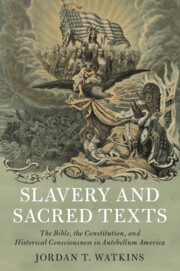 Slavery and Sacred Texts
Slavery and Sacred Texts Book contents
- Slavery and Sacred Texts
- Cambridge Historical Studies in American Law and Society
- Slavery and Sacred Texts
- Copyright page
- Dedication
- Contents
- Acknowledgments
- Prologue
- Introduction
- 1 “Recourse Must Be Had to the History of Those Times”
- 2 “The Ground Will Shake”
- 3 “Texts … Designed for Local and Temporary Use”
- 4 “The Further We Recede from the Birth of the Constitution”
- 5 “The Culture of Cotton Has Healed Its Deadly Wound”
- 6 “Times Now Are Not as They Were”
- 7 “We Have to Do Not … with the Past, but the Living Present”
- 8 A “Modern Crispus Attucks”
- Conclusion
- Epilogue
- Index
3 - “Texts … Designed for Local and Temporary Use”
Published online by Cambridge University Press: 12 June 2021
- Slavery and Sacred Texts
- Cambridge Historical Studies in American Law and Society
- Slavery and Sacred Texts
- Copyright page
- Dedication
- Contents
- Acknowledgments
- Prologue
- Introduction
- 1 “Recourse Must Be Had to the History of Those Times”
- 2 “The Ground Will Shake”
- 3 “Texts … Designed for Local and Temporary Use”
- 4 “The Further We Recede from the Birth of the Constitution”
- 5 “The Culture of Cotton Has Healed Its Deadly Wound”
- 6 “Times Now Are Not as They Were”
- 7 “We Have to Do Not … with the Past, but the Living Present”
- 8 A “Modern Crispus Attucks”
- Conclusion
- Epilogue
- Index
Summary
This chapter outlines antislavery readings of the Bible during the 1830s and 1840s, highlighting their implications for historical awareness. It shows how words such as context, circumstance, and accommodation seeped into the readings of figures who demonstrated little interest in or awareness of biblical criticism and suggests that even interpretations that did not privilege historical explication sometimes challenged the assumption of a close correspondence between biblical and modern times. The historicizing process began with the most distant periods in question, the Old Testament eras, before encroaching on the period of the New Testament. As debate rested on the New Testament, a number of antislavery readers argued that Christ and his apostles had planted the seeds of slavery’s abolition, a reading that further highlighted historical distance. The argument that the universal principles would find fulfillment in the future drew attention to the distance between the biblical past and the American present. This contention, which retained faith in sacred texts, held great potential to spread awareness of that distance.
Keywords
- Type
- Chapter
- Information
- Slavery and Sacred TextsThe Bible, the Constitution, and Historical Consciousness in Antebellum America, pp. 109 - 133Publisher: Cambridge University PressPrint publication year: 2021
